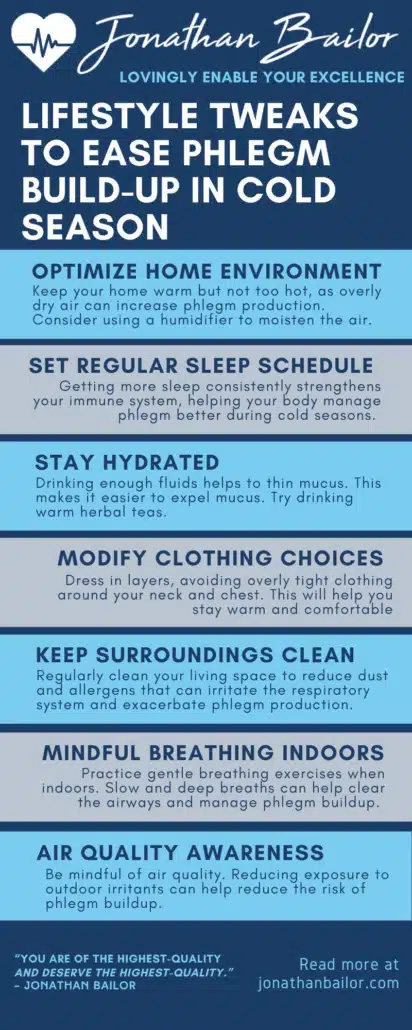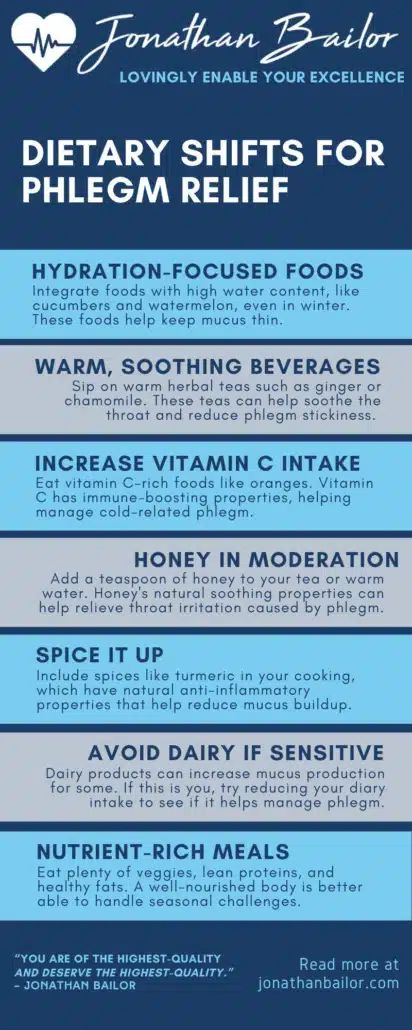28 Ways to Combat Phlegm Build-up During Cold Season
Here are 28 ways you combat phlegm build-up during cold season in this Cough and Phlegm blog post guide with Jonathan Bailor!
When the cold season rolls in, it brings along the unwelcome guest of phlegm build-up, turning what could be cozy winter days into a chorus of coughs, stuffy noses, and sniffles. But fret not, because navigating through this phlegmy maze doesn’t have to be a daunting journey. Think of it as tuning your body’s natural defenses to the season’s rhythm, transforming your approach to cold weather from reactive to proactive.
If phlegm or cough is troubling you then dive into our Embracing 23 Natural Remedies to Clear Phlegm and Ease Cough and 25 Home Remedies to Ease a Persistent Cough guides!
This guide is about empowering you with practical, easy-to-adopt strategies that can help keep phlegm at bay during these chilly months. It’s not about complex medical advice; it’s about simple, effective ways to enhance your body’s resilience against cold-induced phlegm build-up. Whether you’re at home, at work, or enjoying the winter outdoors, these tips are designed to fit seamlessly into your life, bringing both relief and empowerment.
As you read through these strategies, imagine the comfort and clarity they can bring to your respiratory health. Picture sharing these tips with friends over a warm cup of tea or discussing them at a family gathering. This isn’t just knowledge for you; it’s wisdom worth spreading. In sharing, you’re not only offering solutions but also fostering a community of health, care, and mutual support. Let’s embark on this journey together, transforming our approach to the cold season, one breath at a time.
Lifestyle Tweaks: Easing Phlegm Build-up in Cold Season
Adapting your lifestyle to the cold season can have a significant impact on managing phlegm build-up. Here are some changes that can be seamlessly integrated into your daily routine:
1. Optimize Your Living Environment
Keep your home comfortably warm but not too hot, as overly dry air can exacerbate phlegm. Consider using a warm or cool mist humidifier to maintain optimal humidity levels, creating a more lung-friendly environment during the colder months.
2. Embrace a Consistent Sleep Schedule
Prioritize a regular sleep routine. Getting more sleep consistently strengthens your immune system, which in turn helps your body manage phlegm more effectively during cold seasons.
3. Stay Hydrated
Even though it’s cold, don’t skimp on hydration. Drinking enough fluids helps to thin mucus. This makes it easier to expel mucus. Warm herbal teas can be particularly soothing and hydrating during the winter.
4. Modify Your Clothing Choices
Dress in layers, avoiding overly tight clothing around your neck and chest. This will help you stay warm and comfortable, adjusting to different indoor and outdoor temperatures without straining your breathing.
5. Keep Your Surroundings Clean
Regularly clean your living space to reduce dust and allergens that can irritate the respiratory system and exacerbate phlegm production.
6. Mindful Breathing Indoors
Practice gentle breathing exercises when indoors. Conscious, slow, and deep breaths can help clear the airways and manage the buildup of phlegm.
7. Air Quality Awareness
Be mindful of air quality, especially on days when pollution levels are high. Minimizing exposure to outdoor irritants can help reduce the risk of phlegm buildup and respiratory discomfort.
Incorporating these lifestyle changes can make a noticeable difference in managing phlegm during the cold season, leading to more comfortable and clearer days.

Feeling Better Is Priceless, That's Why We Don't Put A Price On It!
“It’s Like A Free and Medically Valid Version of Noom and Weight Watchers Online”
~ Dr. Doctor Matthew Oleshiak, MD
Click the 'LEARN MORE' button below for free lifetime access to the fast fix program developed by Jonathan and top Ivy League Medical Doctors
LEARN MOREP.S. It's not a free trial. It's not part of the program for free. The entire program is free, forever, for real! No credit card needed.
Nourishing Choices: Dietary Shifts for Phlegm Relief
Altering your diet during the cold season can be a key strategy for managing phlegm build-up. Here are some dietary changes that can help soothe and reduce phlegm:
1. Hydration-Focused Foods
Integrate foods with high water content, like cucumbers, celery, and watermelon, even in winter. These foods not only provide essential hydration but also help keep mucus thin, making it easier to clear.
2. Warm, Soothing Beverages
Sip on warm herbal teas such as ginger, peppermint, or chamomile. These beverages can help soothe the throat and reduce the stickiness of phlegm.
3. Increase Vitamin C Intake
Incorporate vitamin C-rich foods like oranges, kiwis, and bell peppers. Vitamin C is known for its immune-boosting properties, which can be beneficial in managing cold-related phlegm, such as a runny nose and sore throat.
4. Honey in Moderation
Add a teaspoon of honey to your tea or warm water. Honey’s natural soothing properties can help relieve throat irritation caused by phlegm.
5. Spice It Up
Include spices like turmeric and cayenne pepper in your cooking. These spices have natural anti-inflammatory properties that can help reduce mucus buildup.
6. Avoid Dairy If Sensitive
For some, dairy products can exacerbate mucus production. If you notice this effect, try reducing your milk, cheese, and yogurt intake to see if it helps manage phlegm.
7. Balanced, Nutrient-Rich Meals
Focus on balanced meals with plenty of vegetables, lean proteins, and healthy fats. A well-nourished body is better equipped to handle seasonal challenges, including excess mucus production.
These dietary adjustments, tailored for the cold season, can effectively help manage phlegm, bringing comfort and clarity to your winter days.

Active Remedies: Exercise Strategies for Phlegm Management
Physical activity, especially during the cold season, can play a pivotal role in managing phlegm build-up. Here’s how you can adapt your exercise routine to help:
1. Brisk Walking
Incorporate brisk walks into your daily routine. This gentle yet effective exercise enhances blood circulation and respiratory function, helping to mobilize and expel phlegm.
3. Indoor Swimming
If accessible, try indoor swimming. The warm, humid environment of an indoor pool can help loosen phlegm, while the activity itself boosts overall lung capacity and health.
3. Steam Room Post-Workout
If you have access to a steam room, use it after your workout. The moist, warm air can help break down and loosen phlegm, making it easier to clear from your respiratory passages. It also helps relieve a stuffy nose.
4. Gentle Yoga
Engage in gentle yoga practices, focusing on poses that open up the chest and stimulate the thoracic region. This can aid in loosening mucus in the respiratory tract.
5. Light Aerobic Exercises
Integrate light aerobic exercises, like cycling or low-impact aerobics, into your routine. These activities can increase your heart rate and improve lung function, aiding in phlegm management.
6. Breathing Exercises
Practice deep breathing exercises, like diaphragmatic breathing. Such exercises can help strengthen your respiratory muscles and improve the clearance of phlegm.
7. Dance Therapy
Consider dance therapy or just dancing to your favorite tunes at home. Dancing is not only a joyful way to exercise but also enhances lung function and mucus clearance.
By incorporating these physical activities into your daily life, you can effectively manage phlegm build-up, enhancing your comfort and health during the cold season.

Inner Peace, Outer Health: Mental and Spiritual Strategies for Managing Phlegm
Tending to your mental and spiritual well-being can be surprisingly effective in managing phlegm, especially during the cold season. Here are some changes to consider for holistic health:
1. Mindful Meditation
Practice daily mindful meditation. This calming practice can reduce stress, which is often a contributing factor to respiratory issues. A relaxed mind can lead to a more relaxed respiratory system, aiding in phlegm management.
2. Positive Visualization
Engage in positive visualization techniques, imagining your respiratory system functioning smoothly and efficiently. This mental exercise can positively influence your body’s physical response to colds and reduce phlegm production.
3. Laughter Therapy
Incorporate laughter into your daily routine. Laughter is a natural stress reliever and also acts as a gentle exercise for your respiratory system, helping to break up and expel phlegm.
4. Gratitude Journaling
Maintain a gratitude journal. Focusing on the positive aspects of your life can lower stress levels, which in turn may help reduce the body’s production of phlegm.
5. Yoga and Deep Breathing
Incorporate gentle yoga and deep breathing practices. These activities can improve lung capacity and airway clearance, providing relief from phlegm build-up.
6. Spiritual Practices
Participate in spiritual practices that align with your beliefs and values. This can include activities like prayer, chanting, or attending religious services. Such practices can offer peace and reduce the stress that can exacerbate respiratory issues.
7. Nature Connection
Spend time in nature or with indoor plants. This connection can be grounding and healing, promoting a sense of calm that positively impacts your respiratory health.
These mental and spiritual practices provide a holistic approach to managing phlegm, emphasizing the interconnectedness of mind, spirit, and body for overall health and well-being.

Soothing Secrets: Cough and Phlegm FAQ
When it comes to navigating the challenges of coughs and phlegm, questions abound. Let’s delve into some common inquiries for clarity and comfort:
Q1: What causes phlegm during a cough?
Phlegm, a form of mucus, is produced by your respiratory tract as a defense against infection or irritants. It will also make your mucus thicker. When you cough, especially during a cold, flu, or sinus infection, it’s your body’s way of trying to expel this excess mucus and clear your airways.
Q2: Why does my cough get worse at night?
Coughs often worsen at night due to lying down. This position can cause mucus to pool in your throat, leading to increased coughing. Dry air in your bedroom and allergens in your bedding can also exacerbate nighttime coughing.
Q3: Can certain foods worsen cough and phlegm?
Yes, certain foods can exacerbate cough and phlegm. Dairy products, for some, may lead to more mucus and excess phlegm. Spicy and acidic foods can trigger acid reflux, which often leads to coughing. Observing how your body responds to different foods can guide your dietary choices.
Q4: Is it helpful to suppress a cough?
While it might seem logical to suppress a cough, it’s actually your body’s natural way of clearing phlegm and irritants from the lungs and throat. However, seeking medical advice is important if a cough is persistent and disruptive.
Q5: How can I naturally reduce phlegm?
Staying hydrated helps prevent thick mucus. Indeed, it thins mucus, making it easier to expel. Warm liquids, like herbal teas, can be soothing. Humidifiers add moisture to the air, reducing throat irritation. Gentle exercises and breathing techniques can also aid in mucus clearance.
Q6: What conditions cause excess mucus?
Several conditions can cause excess mucus and phlegm production, including sinus infections, the common cold, seasonal allergies, cystic fibrosis, respiratory infections, some prescription medications, viral infections, and asthma.
Navigating the complexities of coughs and phlegm with these insights can lead to more effective management and relief, enhancing your comfort and respiratory health.
Breathe Easy: Sharing the Path to Cough and Phlegm Relief
As we conclude our exploration into the world of coughs and phlegm, remember that these insights are more than just personal remedies; they’re lifelines to clearer breathing. If you’ve found relief and understanding in these pages, don’t keep it to yourself. Share this beacon of clarity with friends and family through social media or a thoughtful email.
Spreading this knowledge isn’t just about offering solutions; it’s about nurturing a community of care, support, and shared health. Together, let’s help everyone breathe a little easier, embracing and sharing the journey towards respiratory wellness.
Feeling Better Is Priceless, That's Why We Don't Put A Price On It!
“It’s Like A Free and Medically Valid Version of Noom and Weight Watchers Online”
~ Dr. Doctor Matthew Oleshiak, MD
Click the 'LEARN MORE' button below for free lifetime access to the fast fix program developed by Jonathan and top Ivy League Medical Doctors
LEARN MOREP.S. It's not a free trial. It's not part of the program for free. The entire program is free, forever, for real! No credit card needed.




